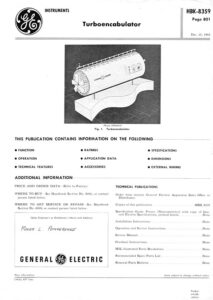“For when they speak great swelling words of emptiness, they allure through the lusts of the flesh, through lewdness, the ones who have actually escaped from those who live in error” (2 Peter 2:18).
In 1946, the British Institution of Electrical Engineers documented a previously unknown mechanical device called the “Turbo Encabulator.” That device was previously unknown for a good reason- it was a fictitious machine that was created for the amusement of the engineers who invented it. The product documentation for the Turbo Encabulator was thus infused with a humorous maze of techno babble, mechanical gibberish, and imaginative descriptions of fictional components.

Engineers at the General Electric corporation later built upon that work with the publication of a data sheet for the Turboencabulator. This bulletin was similar to the documentation created for other devices manufactured by General Electric, but contained the same ridiculous technical jargon. An excerpt from that publication offers an amusing sample of this pseudo-technical language…
“Based on the principle of power generation by the modial interaction of magnetoreluctance and capacitive directance, the Turboencabulator negates the relative motion of conventional conductors and fluxes… In addition, whenever a barescent skor motion is required, it may be employed with a reciprocating dingle arm to reduce the sinusoidal depleneration in nofer trunnions.”
An instructional video for the Turbo Encabulator was later created that mimicked the industrial training films of the 1960’s with the same entertaining results.
While the Turbo Encabulator was invented to make us laugh, there was nothing funny about the heretical teachers of the first century, or those who carry on their work today. Much like the imaginary Turbo Encabulator, such teachers hide false doctrines and religious platitudes inside “great swelling words of emptiness.” These void and empty teachings thus masquerade as penetrating insights, but actually deliver little or nothing of spiritual value.
We can often identify the presence of such teaching with the following question: “How much Scripture does this person use in his or her teachings?” Religious books, messages, or presentations that routinely feature little or no Biblical text should thus serve as warnings. Spiritual teachings that are not supported by the text or context of a Biblical passage should also be viewed with great suspicion.
The insight offered by one source is one that bears repeating in this regard…
“…There are various ways to use the word of God deceitfully, or to tamper with it. Using a Bible text to preach a ‘sermon’ that has little or nothing to do with the Bible is one of the common ways of doing it.” (1)
Image Credit: Engineers at General Electric’s Instrument Department, Public domain, via Wikimedia Commons https://commons.wikimedia.org/w/index.php?search=Turboencabulator&title=Special:MediaSearch&go=Go&type=image
(1) Paul T. Butler. The Bible Study Textbook Series, Studies In Second Corinthians (College Press) [p. 93] Copyright © 1988 College Press Publishing Company https://archive.org/stream/BibleStudyTextbookSeriesSecondCorinthians/132Corinthians-Butler_djvu.txt

